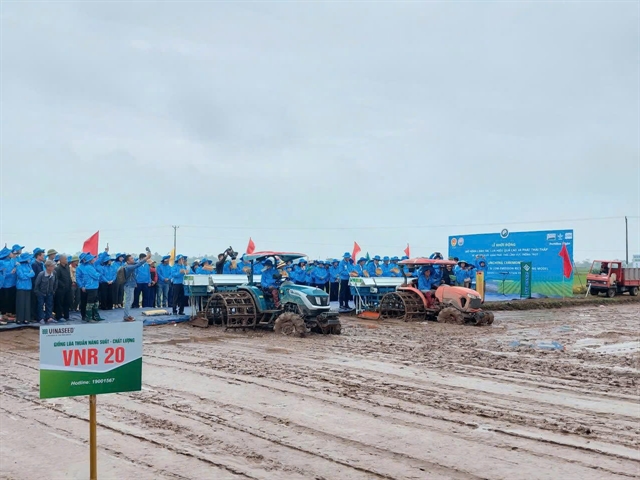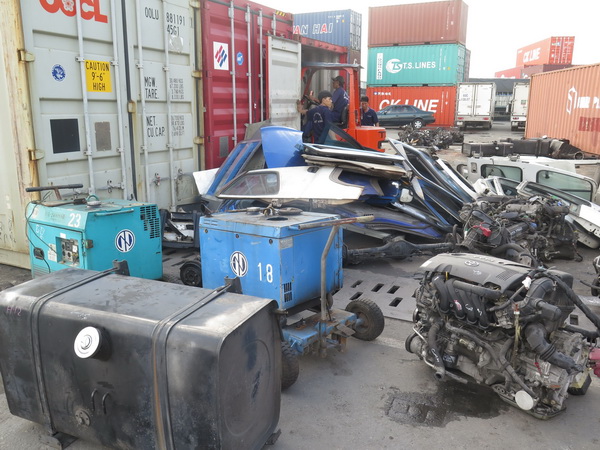 Environment
Environment

Limitations in environmental protection at industrial zones and medical waste treatment at hospitals as well as shortcomings in imported-scrap management in the 2016-2018 period have been highlighted after the State Audit of Việt Nam (SAV) conducted recent environmental audits.

|
| Scrap imported to Cát Lái Port in HCM City. — VNA/VNS Photo Hoàng Hải |
HÀ NỘI — Limitations in environmental protection at industrial zones and medical waste treatment at hospitals as well as shortcomings in imported-scrap management in the 2016-2018 period have been highlighted after the State Audit of Việt Nam (SAV) conducted recent environmental audits.
Data from SAV showed that in the 2016-2018 period, environmental pollution caused by industrial activities became more serious than ever, leading to heavy damage to the environment as well as human life and health.
In response to the situation, SAV implemented three in-depth audits on waste management and treatment in industrial zones in the provinces of Vĩnh Phúc, Ninh Bình and Bắc Ninh, as well as an audit of environmental management at Vĩnh Tân 1 Thermal Power in Bình Thuận Province.
These audits aimed to clarify the shortcomings and make recommendations to the authorities to promptly resolve environmental incidents, SAV said.
Managerial agencies did not promptly handle violations of environmental protection according to regulations; there was no measure to track local companies or production facilities to take remedial work, and there was a failure to track the amount of generated and treated waste in the industrial zones.
Therefore, SAV proposed the managerial agencies re-check the implementation of remedial work by local companies and production facilities, build an online database on environment and submit it to the Ministry of Natural Resources and Environment to amend regulations and clarify the role of managerial agencies in protecting the environment around the industrial zones.
For medical waste, SAV focused on the accountability audit of the Ministry of Health, the People's Committee of Hà Nội and more than 20 hospitals as well as medical waste treatment units in the city.
The audit results showed that most hospitals violated regulations on management and treatment of medical waste.
Specifically, 82 per cent of the hospitals did not follow regulations on operating their wastewater treatment systems, such as not monitoring the discharged wastewater amount every day; not fully collecting all wastewater to the treatment system and not performing periodic system maintenance. Some 59 per cent of the total hospitals did not fully and promptly report on their medical-waste management results.
Thus, SAV recommended the managerial agencies take responsibility to instruct the hospitals to seriously follow regulations on environmental protection as well as implement remedial work to fix current shortcomings.
It also asked the environment ministry to amend regulations to tighten the supervision of the transportation and treatment of hazardous waste; clarifying the statute of limitations for violating regulations on unlicensed wastewater discharge and exploitation.
For the audit of imported-scrap management, SAV has already conducted an audit on three ministries, including those of Natural Resources and Environment, Industry and Trade; and Finance, as well as three provinces of Hồ Chí Minh, Hải Phòng and Bà Rịa-Vũng Tàu, which had the highest amount of scrap in the country.
The objective of the audit was to evaluate the management of imported-scrap by the three ministries, SAV said.
The audit’s results revealed that documents and regulations on the management of imported scrap of the ministries were incomplete, delayed and there was no plan for problems and risks, leading to passivity and delays in controlling and handling problems and risks.
There was also no agency to forecast the need to import scrap for production as a basis for calculating the overall volume of scrap to be imported in accordance with the real situation, SAV said.
SAV asked the ministries and relevant agencies to study and consult with the Government to review, adjust and issue a series of new mechanisms and policies on imported-scrap management, including the mechanism to determine the volume of imported scrap, the plans for problem and risks, the list of scrap permitted to be imported and regulations on coordination among management units.
SAV, with the role as ASOSAI Chairman for the 2018-21 term, will conduct more audits on issues relating to biodiversity conservation, climate change adaptation and green energy, especially focusing on the implementation of the Sustainable Development Goals of the United Nations by 2030.— VNS




